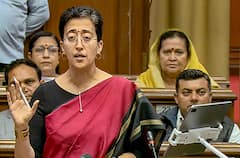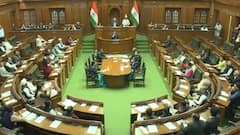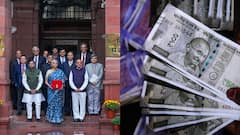Budget 2024 Expectations Highlights: Experts Call For Tax Reforms, Special Schemes Across Sectors
Budget 2024 Expectations Highlights: Please follow this space for all the latest updates related to the expectations from Union Budget 2024
LIVE

Background
Budget 2024 Expectations Highlights: Union Finance Minister Nirmala Sitharaman is ready to present the fiscal year 2024-25 budget on July 23 in parliament. This will be the first full Union Budget of the Modi 3.0 government, and the common man, along with India Inc., has great expectations from it. As per the official notification, the Budget Session of Parliament is scheduled to begin on July 22 and conclude on August 12.
In keeping with tradition, the Union Budget will be presented by Sitharaman at 11 am on July 23.
The Union Budget speech will be delivered in the Lok Sabha at 11 am. It will be broadcast live on various government channels, including national broadcaster Doordarshan, Parliament’s channels, and the Government of India's YouTube channels. Sansad TV will also cover the event. To watch the budget speech online and access Budget documents, viewers can visit the official portal www.indiabudget.gov.in, where livestreaming and critical documents will be available.
Several industry leaders have shared their expectations from the upcoming budget. On Wednesday, the Indian Chamber of Commerce (ICC) proposed that the government streamline customs duties across various sectors, such as steel, solar batteries, aluminium, and lithium cells, to bolster domestic manufacturing.
ICC President Ameya Prabhu stressed the importance of implementing protective measures to support the expansion of domestic industries, especially in sectors such as steel, solar batteries, aluminium, and lithium cells. Prabhu suggested, "There is a need for rationalisation of customs duty in these specific sectors in a holistic manner. Huge potential is there to boost domestic manufacturing and make India a global hub for manufacturing."
Furthermore, he advocated for correcting the inverted duty structure by lowering the duty on mixed petroleum gas from 5 per cent to 2.5 per cent. "To boost domestic manufacturing, there is a need to increase duty on polymers - polyvinyl chloride, polyethylene terephthalate, polypropylene and polyesters to 10 per cent. This will help in reducing import dependency and will drive India towards self-sufficiency in the petrochemical manufacturing segment," he added.
Simplifying GST Rules, Investing In Job Training: Here's Consumer Durables Sector's Wishlist
Avneet Singh Marwah, CEO of Super Plastronics, emphasised the government's role in stimulating the economy and addressing inflation by implementing strategies that promote spending and investment. "Simplifying GST rules, investing in job training, and changing tax brackets for consumers are essential steps. Keeping the 15 per cent corporate tax rate for new manufacturing ventures would attract both local and international businesses to set up shop in India," Marwah said.
"Additionally, expanding the Production-Linked Incentive (PLI) scheme in the electronics sector can help Indian manufacturers grow," he noted.
Expectations High On Formalising India's Extensive Informal Workforce: Expert
Kartik Narayan, CEO-Staffing at TeamLease Services Limited, looks ahead to the upcoming budget and expects the new government to demonstrate a strong commitment to formalising India's extensive informal workforce. "The forthcoming budget must continue to foster an inclusive, stable economic landscape, and most importantly, it must champion the cause of workforce formalisation, a task that cannot be delayed," opined Narayan.
FMCG Sector Looking Forward To Potential Reductions In GST Rates
Ravi Kabra, Co-Founder of Skippi, sees significant potential in the upcoming budget to stimulate growth and innovation in India's FMCG sector. The industry confronts various challenges that necessitate thoughtful policy interventions to resolve them. "The current GST structure imposes significant burdens, particularly on essential FMCG products, particularly through potential reductions in GST rates for essential products currently burdened by high 18 per cent taxes. Infrastructure development, especially for cold chain facilities and warehousing, is crucial to accommodate the growth in beverages and frozen goods," Kabra said.
Real Estate Experts Anticipates Tax Incentives For Green Building Projects
Harish Fabiani, Group Chairman of IndiaLand Properties, eagerly anticipates positive announcements regarding the status of the real estate industry and the streamlining of current regulatory norms. "I believe that industry status can help more small and medium builders and developers to get recognized as MSMEs and access low-rate credit to support their growth. Such a move could help boost the sector’s growth and increase the inflow of foreign investor participation significantly. We are also hoping for some tax incentives for green building projects and an increase in the existing deduction limit of Rs.2 lakh for the interest component paid on home loans."
Govt Should Maintain Sustained Push Towards Investments In Housing: HIL's CEO
Akshat Seth, Managing Director and CEO at HIL Ltd highlighted the Government's recent emphasis on an investment-driven growth strategy, leading to substantial improvements in the country's infrastructure. "We expect the Government to sustain the push towards investments in housing, highways, and rail corridors. This will augment long-term income growth and sustain demand for home and building materials in the country and also promote innovation in the industry," he said
Trending News
Top Headlines





































